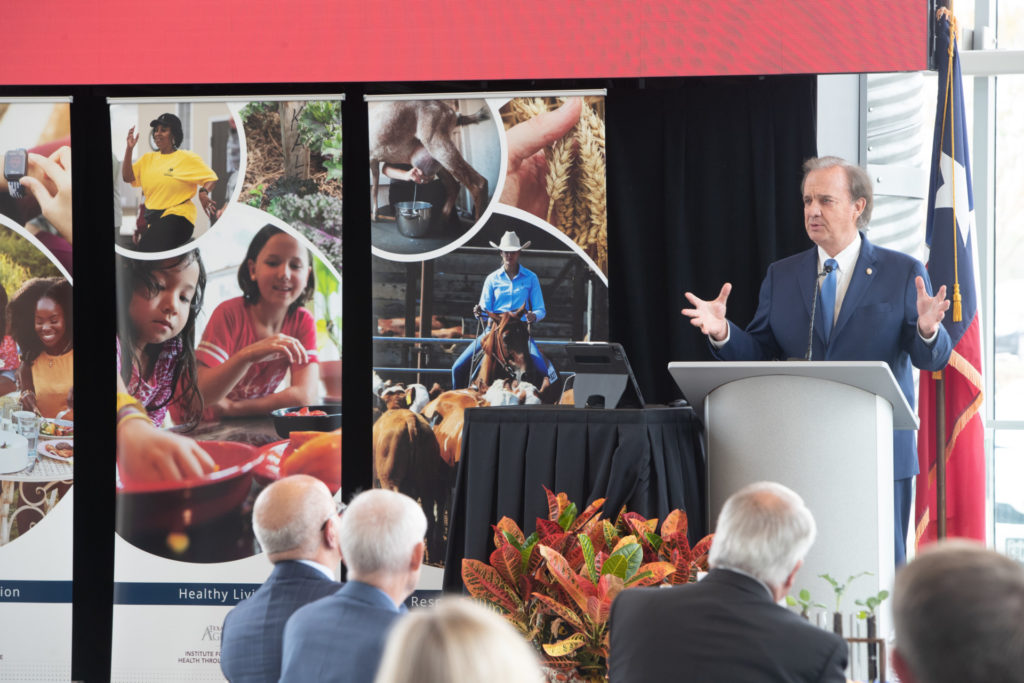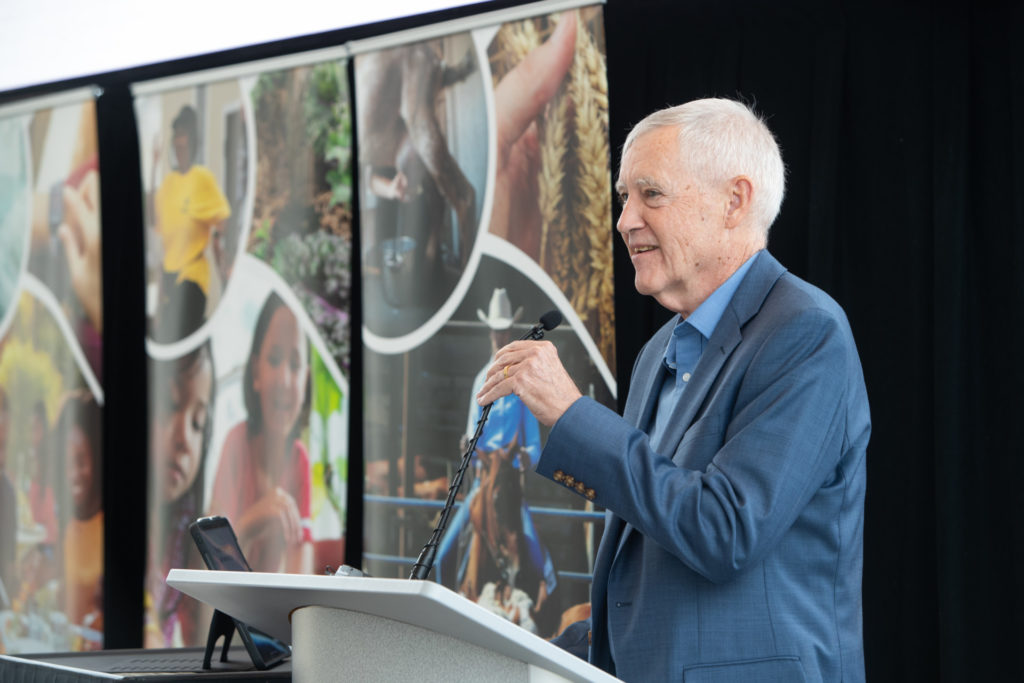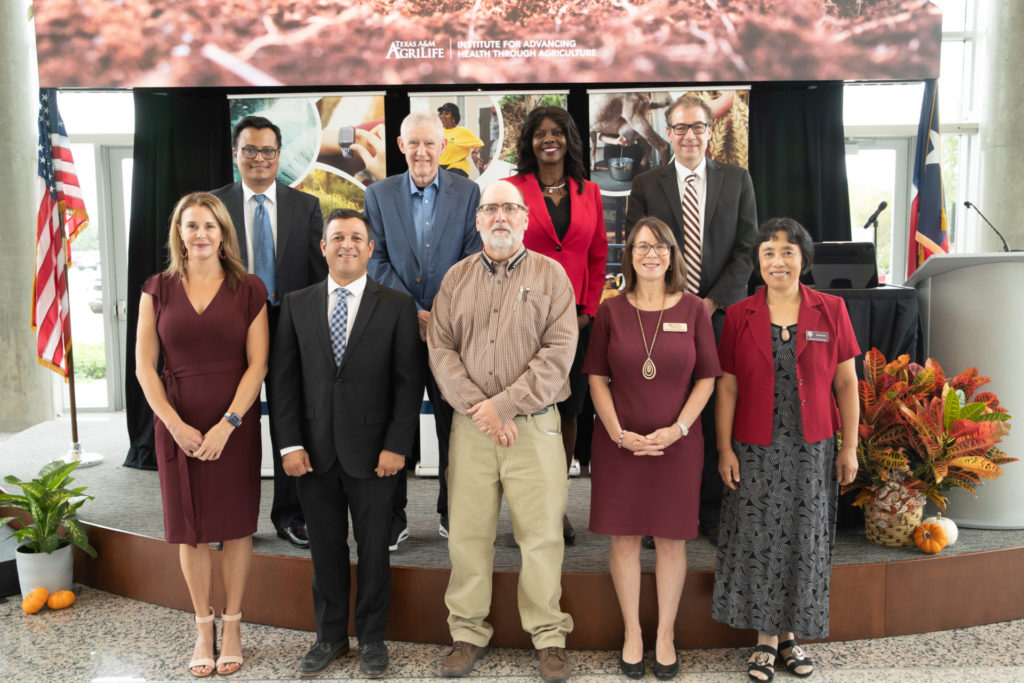Aggies tout agricultural research in combating diet-related chronic disease
USDA chief scientist, 2016 World Food Prize laureate, celebrate early progress by Institute for Advancing Health Through Agriculture
The Texas A&M AgriLife Institute for Advancing Health Through Agriculture, IHA, embraced agriculture as the solution to diet-related chronic disease in a way that is environmentally sustainable and economically viable with an event Oct. 7 at the Shirley and Joe Swinbank ’74 AgriLife Center.

The event, “Ag Solves When Aggies Solve,” highlighted how Texas A&M AgriLife researchers rapidly are advancing this idea and featured keynote addresses by Chavonda Jacobs-Young, Ph.D., U.S. Department of Agriculture chief scientist and undersecretary for research, education and economics, and Howarth “Howdy” Bouis, Ph.D., 2016 World Food Prize laureate.
“We are proud to have the Texas A&M AgriLife Institute for Advancing Health Through Agriculture as a partner in innovation as we work toward President Biden’s whole-of-government, whole-of-society plan to make progress on nutrition security and diet-related diseases,” said Jacobs-Young.
More than 150 Aggies gathered for the event, learning about the IHA’s mission and getting updates about recent research funding and other opportunities ahead.
Texas A&M is leading the way
“The health of every Texan has the potential to be improved by our work,” said John Sharp, chancellor of the Texas A&M University System. “It will require that we all collaborate, look for opportunities to engage with fellow land-grant universities and work together.”

After opening remarks from Sharp and the keynote addresses, IHA associate members gave a series of lightning talks about innovative research across precision nutrition, responsive agriculture and social and behavioral healthy living research.
Lightning talk speakers were:
- Regan Bailey, Ph.D., IHA associate director for precision nutrition, “Leveraging Precision Nutrition for a Healthier Texas.”
- Yuxiang Sun, Ph.D., Texas A&M AgriLife Research, professor, Department of Nutrition, “Nutrient-Sensing Ghrelin Signaling in Health and Disease: An Immunometabolic Perspective.”
- Marco Palma, Ph.D., professor, Department of Agricultural Economics, director of the Human Behavior Laboratory, “Using Altruism to Propel Behavioral Changes.”
- Sunil Dhoubhadel, Ph.D., assistant professor, Department of Agriculture, Nutrition and Human Ecology, Prairie View A&M University, “Understanding the Economics of U.S. Meat Goat Markets.”
- Beth Racine, Ph.D., director, Texas A&M AgriLife Research Center at El Paso, and Texas A&M AgriLife Extension Service associate department head in the Department of Nutrition, “SNAP, WIC and Food Retail.”
- Bill Rooney, Ph.D., Regents Professor and Borlaug-Monsanto Chair for Plant Breeding and International Crop Improvement, Department of Soil and Crop Sciences, “Developing Specialty Grain Sorghum Hybrids for Health Food Markets.”
Since launching in February, the IHA has made incredible progress, securing top talent for leadership positions, granting more than $1.5 million to Texas A&M AgriLife researchers and advancing key research initiatives, including the use of new mobile health assessment units whose primary goal is to provide researchers with the ability to reach underserved populations across Texas, promoting health equity and reducing health disparities.
“In just seven months, this team has launched an institute poised to be the catalyst to transform food systems around the world,” said Patrick Stover, Ph.D., director of the IHA. “Everyone in this room plays an important role in that effort, and today’s event is meant to celebrate all of you and what we’re collectively working toward.”
The IHA has an embedded research unit of the USDA-Agricultural Research Service, focused on responsive agriculture, including the use of big data, artificial intelligence and machine learning. The IHA is the first academic institution in the world to use precision nutrition, responsive agriculture, and social and behavioral healthy living research together to improve human health in a way that supports the environment and producers.
With the view that agriculture is the solution to diet-related chronic disease, the IHA is working to serve as a platform for the exchange of big ideas to improve human health, economic prosperity and support of the environment.
A global perspective
Bouis, an economist focused on agriculture, nutrition outcomes and reducing micronutrient malnutrition, spoke about the progressive use of agriculture in low-income countries with an emphasis on plant breeding.

In 2016, Bouis received the World Food Prize for his efforts in advancing biofortification. The World Food Prize Committee said he focused tirelessly on showing “agriculture could provide more nutritious staple crops, which could reduce the micronutrient deficiencies that can cause malnutrition, blindness, disease and even early death among vulnerable populations in Africa and Asia, and Latin America, particularly children under the age of five.”
“Agricultural solutions to reducing malnutrition tend to be the most cost-effective and sustainable interventions, although patience and perseverance over many years is required to mainstream these solutions in diets,” Bouis said in his keynote speech. “Therefore, I was excited to learn of the visionary establishment of IHA and the involvement of USDA-ARS, and to be educated about the approaches being taken.”
Advancing the IHA mission
The IHA has brought on more than 90 affiliate members. Affiliate members provide meaningful support to the mission and vision of IHA, such as strengthening technical capabilities and serving as co-investigators. Researchers may apply at any time to become affiliate members of the IHA, connecting them to other IHA researchers and giving them access to important information from the IHA.

At the same time, the IHA has awarded $1.5 million to support precision nutrition, responsive agriculture, and social and behavioral healthy living research to 15 IHA associate members. Six of these researchers presented on their latest work during the event to highlight key research efforts underway.
“Integrating knowledge in precision nutrition, responsive agriculture, and social and behavioral sciences will be an effective approach to improving human health through agriculture,” Dhoubhadel said. “I am glad that Prairie View A&M University is one of the partners in this innovative initiative championed by the IHA,” Stover said the team at IHA is looking forward to continuing to build upon its mission by partnering with the Chicago Council on Global Affairs to host a Conference on Agriculture for Health in early November in Chicago for thought leaders throughout the ag-food value chain. The conference seeks to set priorities for solving the challenges of human health, economic vitality and the environment through agriculture. More information is forthcoming.


